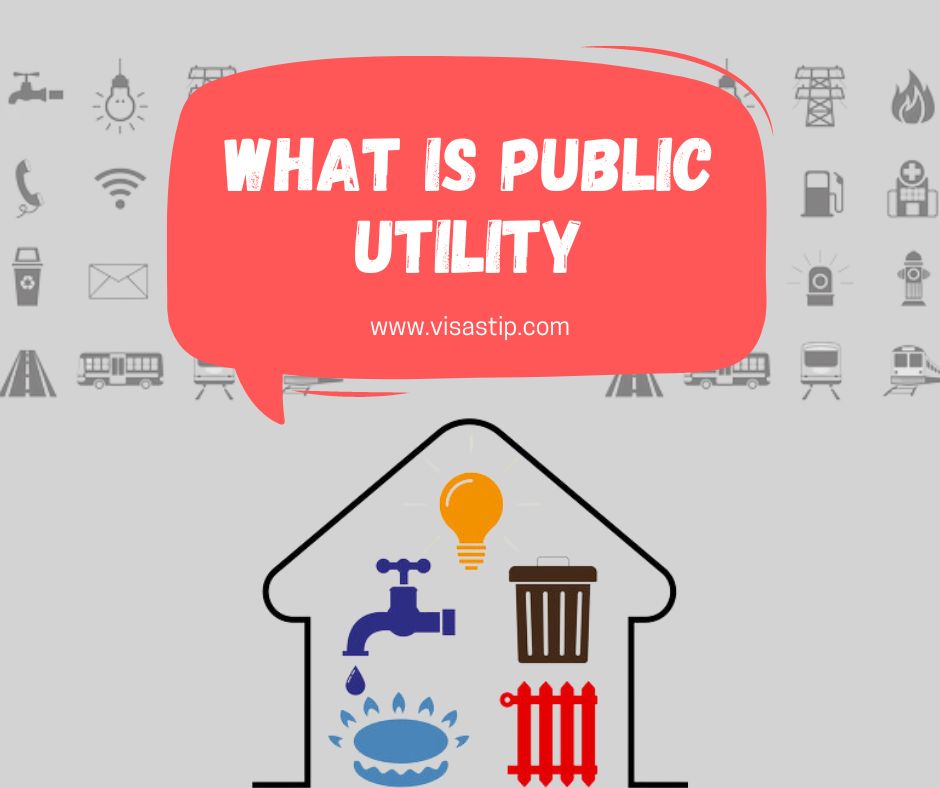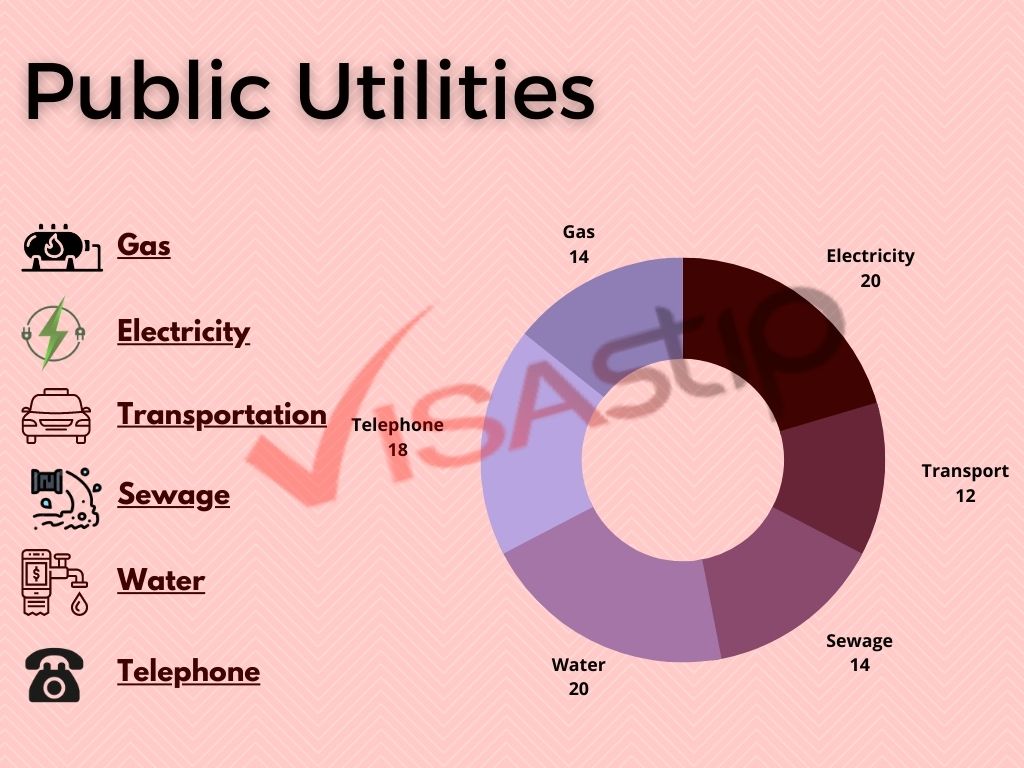Public utilities are a vital part of modern society and help us daily.
Most of us take public utilities for granted. We turn on our faucets, and water comes out. We use electricity in our homes and offices to power our lights, appliances, and electronics. We drive our cars around on paved roads. We don’t have to think about these things because they’re so commonplace, but they wouldn’t be possible without public utilities.
Public utilities provide the infrastructure that makes modern life possible: electrical power plants, natural gas lines, sewer systems, water treatment plants, highways and bridges, etc.
Without them, we’d have no way to heat or cool our homes, no way to get food from farms to stores, and no way for ambulances carrying sick or injured people quickly enough to get where they need to go.
The big question today is whether the career opportunities in public utilities are a good enough reason to encourage young people to enter the field.
What are Public Utilities?

The government or a private company provides public utility services. They provide electricity, water, and gas to people in their area.
These jobs are great for people interested in helping others and making their lives easier. You can work as an engineer, electrician or plumber for a team that builds or repairs public utility systems.
The pay isn’t great, but you’ll get to work with friends and family every day!
The government or a private company provides public utility services. They provide electricity, water, and gas to people in their area.
These jobs are great for people interested in helping others and making their lives easier. You can work as an engineer, electrician or plumber for a team that builds or repairs public utility systems.
The pay isn’t great, but you’ll get to work with friends and family every day!
Is public utilities a good career path?
Yes, working in public utilities can be a lucrative career option because of the high salaries, benefits, and career opportunities that the field offers.
However, this is not the only reason people should consider working in public utilities. One of the most important aspects of working in public utilities is making a difference in people’s lives by providing them with essential services they need daily.
Without public utility workers, many people would be without power, water, or sewage disposal. Public utility workers help keep our society neat. These vital services are available when we need them.
They often work long hours during emergencies to ensure everyone can access these necessities. Because of the importance of their job, public utility workers play a crucial role in keeping our communities safe and healthy.
List of Career Opportunities in Public Utilities

Public utilities are an excellent choice for anyone who wants to be part of the energy and water industries. There are many different types of jobs available, including:
- Energy Manager: The energy manager is responsible for ensuring that the company’s employees have access to electricity and natural gas, as well as other forms of power. They also work with suppliers to ensure that new projects are completed on time.
- Network Engineer: The network engineer is responsible for maintaining all communications systems within a business. This includes maintaining the internal network employees use and ensuring they can still use them if there’s an outage in one part of town.
- Water Treatment Operator: A water treatment operator manages all aspects of a company’s water treatment facility, including purification and distribution. These individuals must ensure that their plants meet regulatory standards while keeping costs down simultaneously.
- Health and Safety Manager: A health and safety manager ensures that a company meets all workplace safety standards. This includes creating policies, managing hazardous waste disposal, and training employees on proper safety procedures.
- Sound Engineer: A sound engineer ensures that any sound system in a business or home is set up correctly. This includes speakers, amplifiers, and any other audio equipment. They must also be able to troubleshoot any problems that may arise.
- Meter reader: A meter reader is responsible for reading customers’ meters for a utility company. This includes taking accurate readings, recording them properly, and promptly delivering them to the customer.
- Telecommunications engineer: A telecommunications engineer is responsible for designing, installing, and maintaining telecommunication networks. This includes both voice and data communications systems. They must be able to troubleshoot any problems with these systems.
Salary Information
Public utility careers offer a range of salaries, depending on the position and where you work. The work of public utilities is essential to daily life. It’s hard to imagine getting through your day without water, heat and electricity.
According to the Bureau of Labor Statistics (BLS), the average annual salary for a public utility manager is $107,000. The top 10 per cent of public utility managers earn more than $162,000 annually.
The average annual salary for water and wastewater treatment plant operators was $64,490 in May 2018. The median annual wage was $62,390—half of all water and wastewater treatment plant operators earned between $56,380 and $72,790.
The pay offered by public utilities varies according to the level of education required for a particular job and how much experience you have in that field. Jobs like electricians and plumbers tend to pay more than administrative positions because they require more training and experience.
Some entry-level positions with public utilities may not require a college degree, but most require at least an associate’s degree or high school diploma. Some jobs may even require a bachelor’s degree in specialized fields such as engineering or business administration.

What sector are utilities in?
The public utility sector is one of the most diverse sectors in the economy. This is because utilities provide a wide range of essential services to residential and commercial customers. Utilities can be found in almost every industry, making this sector an attractive choice for career growth.
The public utility industry is one of the economy’s most stable and secure sectors. This stability is crucial because it allows utilities to provide their customers with a wide range of essential services. The opportunity for growth is crucial because it allows public utility employees to learn new skills and implement their customer’s new technologies to improve customer service.
There are many opportunities for career growth within the public utility sector. For example, employees can become engineers, managers, or planners. They can also become analysts or technicians working on customer service or infrastructure maintenance projects.
The types of public utilities vary by country or region, but they often include:
- Electricity (sometimes called power)
- Water supply
- Sewage disposal
- Gas supply
Importance of the Public utility sector
Public utilities are an essential part of the economy. They make our lives easier and help us get things done in a way that is more efficient than it would be if we had to do everything ourselves. Here are some of how public utilities benefit us:
- They provide power to our homes and businesses. Without this electricity, we wouldn’t have anything to run our computers or TVs on!
- They provide water to our homes and businesses. Without this water, we wouldn’t be able to take showers! And what would we do without toilets?!
- They provide gas to heat our homes during the winter months and cook meals year-round! Our lives would be much more complicated if we didn’t have access to these things!
- They provide transportation systems like buses, trains, subways, etc. These systems make it easier for people who don’t own cars (or even any vehicles) to get around town without having to use their own two feet (which can be dangerous sometimes).
How to pick a career?
When deciding on a career, figuring out what path is right for you can be tough. You may want to consider working in public utilities. Here are five reasons why this may be the perfect path for you:
1. Public utilities provide critical services that are essential to everyday life. If you are passionate about helping others, working in public utilities could be the perfect career.
2. Public utilities offer a variety of job opportunities, so you’re sure to find one that matches your skills and interests. You can work as a technician, engineer, or manager in public utilities, and each position offers unique benefits and challenges.
3. Public utilities are often considered stable careers with good benefits and opportunities for advancement. You can remain in your career for years without worrying about market fluctuations or government policy changes.
4. Public utilities always need talented engineers and technicians, so becoming a part of this industry could lead to long-term career goals and stability.
Types of Public Utilities
There are four types of public utilities:
- A natural monopoly is an industry in which it’s most efficient for one company to provide all services. This is because the cost of duplication would be greater than the benefits of competition.
- A government-owned utility is owned by a local, state or federal government, providing essential services to its community.
- A private investor-owned utility is owned by shareholders and provides essential services to its community. The company has a profit motive and is subject to market forces like other businesses in the economy.
- A cooperative utility is owned by members who receive dividends for their share and provides essential services to its community (for example, farmers’ electric co-ops).
What is Public Utility?
Public utilities include electricity, natural gas, water supply, sewage disposal, and telephones.
Types of Public Utilities?
Here’s a list of some standard public utilities:
-Electricity (power)
-Water (freshwater)
-Sewage (wastewater)
Is Public Utility a good career path?
Conclusion
The field of public utilities can be enriching, with many opportunities for growth and advancement. There are many different aspects to a public utility employee’s work, which means there is a good chance that you will find something that interests you and suits your skill set.
If you are pursuing a career in employee worksites, be sure to research the field thoroughly and consider all the possible options to make the best decision for your future.
